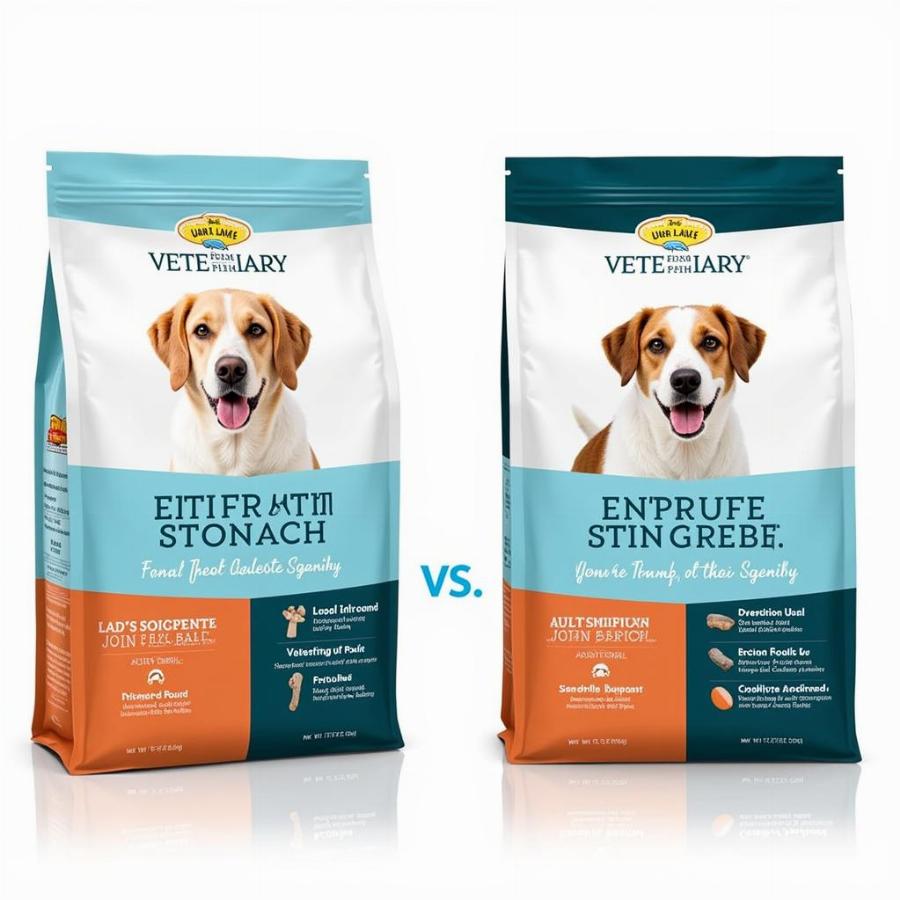Choosing the right food is one of the most important decisions you make for your dog’s health and well-being. While rows of colorful bags at the pet store might seem overwhelming, understanding the benefits of veterinary dog food can provide clarity and guide you toward the optimal nutrition your furry friend deserves.
What Makes Veterinary Dog Food Different?
Veterinary dog food stands apart from regular commercial dog food in several key ways. First and foremost, it’s formulated by veterinary nutritionists, experts who understand the specific dietary needs of dogs at different life stages and with various health conditions.
Here’s what sets veterinary dog food apart:
- Targeted Formulas: Whether your dog is a playful puppy, a senior companion, or facing a health challenge like allergies or joint issues, there’s a veterinary diet precisely balanced to meet those unique needs.
- High-Quality Ingredients: Veterinary diets prioritize easily digestible, high-quality ingredients that provide optimal nutrient absorption and support overall health.
- Therapeutic Benefits: Unlike regular dog food, some veterinary formulas are designed to help manage specific health conditions, acting as a therapeutic tool alongside veterinary care.
When to Consider Veterinary Dog Food
While every dog is different, here are some common situations where your veterinarian might recommend a veterinary diet:
- Growth Stages: Puppies and large breed puppies have specific nutritional requirements to support their rapid growth and development.
- Food Allergies and Sensitivities: Veterinary diets formulated with limited ingredients or hydrolyzed proteins can be a game-changer for dogs with food allergies or sensitivities.
- Weight Management: Whether your dog needs to shed a few pounds or maintain a healthy weight, special formulas can help.
- Organ Health: Veterinary diets can support kidney function, liver health, and other vital organs, particularly in dogs with existing conditions.
- Recovery: Following surgery or illness, a specialized diet can provide the extra nutritional support your dog needs to bounce back.
Choosing the Right Veterinary Dog Food
Navigating the world of veterinary dog food can feel overwhelming, but it doesn’t have to be. Your veterinarian is your most trusted resource. They will consider your dog’s:
- Breed: Certain breeds have predispositions to specific health conditions that might require tailored diets.
- Age and Life Stage: A puppy has very different nutritional needs than an adult or senior dog.
- Activity Level: A working dog requires more calories than a couch potato pup.
- Health History: Any existing health conditions, like allergies, are crucial factors in diet selection.
 Comparing Different Veterinary Dog Food Options
Comparing Different Veterinary Dog Food Options
“Veterinary dog food is not a one-size-fits-all solution,” says Dr. Emily Carter, a board-certified veterinary nutritionist. “It’s about working closely with your vet to determine the specific dietary needs of your dog and choose a formula that supports their overall health and well-being.”
Making the Transition to Veterinary Dog Food
Once you and your vet have selected the right food, it’s important to transition your dog gradually. Start by mixing a small amount of the new food with their old food, slowly increasing the ratio of new food over 7-10 days.
Remember to monitor your dog closely during the transition and consult with your veterinarian if you notice any digestive upset or changes in appetite.
Veterinary Dog Food: Investing in Your Dog’s Long-Term Health
While veterinary dog food might seem more expensive upfront, it’s an investment in your dog’s long-term health and happiness. By providing targeted nutrition, you’re proactively addressing potential health issues and supporting your furry companion to live their best life.
Frequently Asked Questions about Veterinary Dog Food
Q: Can I give my dog veterinary food without consulting my veterinarian?
A: It’s always best to consult with your veterinarian before making any changes to your dog’s diet, including switching to veterinary food.
Q: Is veterinary dog food only for sick dogs?
A: No, veterinary dog food can benefit dogs of all ages and health statuses.
Q: What if my dog doesn’t like the taste of the veterinary food?
A: There are many different flavors and formulas available. Your veterinarian can help you find one that your dog enjoys.
Q: Is veterinary dog food worth the extra cost?
A: Many pet owners find that the benefits of veterinary dog food, such as improved health and fewer vet visits, outweigh the cost.
Q: Can I switch my dog back to regular dog food after they’ve been eating veterinary food?
A: It depends on the reason for the veterinary diet. Always consult with your veterinarian before making any changes.
Looking for more helpful information on dog health and wellness? Check out these related articles:
Beaut Dogs: Your Trusted Source for Canine Expertise
Beaut Dogs is your go-to resource for all things related to our canine companions. We provide expert advice and information to help you give your furry friend the best possible care. For personalized support and answers to your dog care questions, reach out to our team at [email protected]. We’re here to help you navigate the wonderful world of dog ownership with confidence and joy!